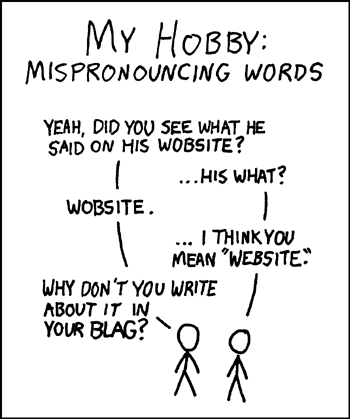Calvin and Hobbes says it best, as usual.
I don't like to write. As a result, I don't write until I absolutely have to. As a result, my writing is noticeably unrefined. As a result, I am graded poorly on my writing. As a result, I associate bad grades with writing. As a result, I don't like to write. The circle of death, or at least the circle of bad grades* *not A's
You may wonder how I'm still stuck in this circle of death when I seem to be aware of the problem. I just spent the last couple of minutes thinking about that myself, instead of writing. Whoops.
Despite the general last-minute-ness of my writing, I don't just sloppily rush through it, throwing words everywhere like I'm searching through last year's mail looking for that suddenly vital document. I'm actually quite deliberate with how I say things.
This reasoned approach helps me in the way I think writing is important: pure communication. If you are trying to get a point across, a simple, to the point style is much better than one stuffed with literary devices. A simile here and there is fine, but if symbolism and allusion are frequent enough that your writing sounds like James Joyce's Ulysses, you need to chill out.
Unfortunately, this simplistic writing style doesn't always fly in classes. First you are made to write about something you are completely uninspired to write about *coughLITERACYNARRATIVEcough*, then you are expected to write artistically. Personally, I think having to fake "deeper" writing is damaging and the notion that unadorned writing is somehow inferior is false. I'm sorry, but I choose my sentence length based on what words need to be in the sentence, not to convey some BS deeper meaning. But it is the way it is. "Improving" your simple writing makes the writing process take a lot longer, and not in a good way.
You first have to think of what to write. As you are writing about something you don't really care about, this takes a long time. There is nothing you want to write about, so that is removed as a criterion. The next thing you think about is what you are able to write about. You have to choose a topic that you can get an acceptable length essay out of. Finally, if you are lucky enough to think of multiple topics on which you could BS an essay, you can choose the one that will be least embarrassing for other people to read, as you know you are going to have to awkwardly peer-conference.
Once you manage to decide on a topic, you then have to try to figure out how to write it so that it will be acceptably artistic. This is especially difficult, as any idea you come up with for something you are uninspired to do will be quite boring. You have to recognize when an opportunity to insert a literary device presents itself. Try to give the illusion that these devices enhance the personal feel that you are trying to fake.
Finally, you actually have to type it out—you have to figure out how to make the inauthentic artistry work in a sentence. Hopefully you can type quite fast, or this part will take almost as long as the other two.
There you go. You have your first sentence. Only pages upon pages of phony emotion to go. Don't worry, it's not due until tomorrow.


